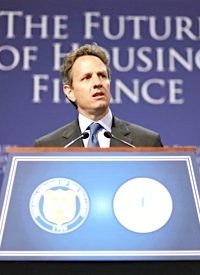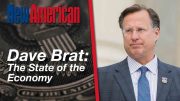
When Kevin Hall, writing for McClatchy Newspapers, said “the Obama administration got what it was looking for at its summit on the future of housing finance,” he was very close to the truth: No matter who spoke at the summit or what “new” ideas might be proposed, nothing would change — the government would remain fully in charge of mortgage financing for the country.
Hall said the summit (officially called, the Conference on the Future of Housing Finance) designed to develop a proposal for Congress by January, “was a starting point for [the] debate, [which will] carry consequences for all Americans,” even including taxpayers who don’t have mortgages.
How this debate is decided could affect everything from the supply of affordable rental housing to tax deductions for mortgage interest to whether Americans pay significantly more to be homeowners.
Treasury Secretary Timothy Geithner made it clear from the start that the private market would have no influence on the conversation: “We will not support returning Fannie and Freddie to the role they played before conservatorship [in September 2008] where they fought to take market share from private competitors while enjoying the privilege of government support. We will not support a return to the system where private gains are subsidized by taxpayer losses.”
Naturally, the people involved in the summit have been enjoying the fruits of government intervention in the housing market for years, as confirmed by Jim McLeod, the president of Coastal States Bank, a community lender in Beaufort County, South Carolina: “I’m impressed with the fact that they’re asking the right people.” One of those heavily involved in profiting from such intervention was Bill Gross, the managing director of PIMCO, the world’s largest bond fund, who opened the summit by proposing still more government intervention to protect lenders from their errors during the housing bubble. His first proposal was “that the Obama administration order Fannie Mae and Freddie Mac to refinance all outstanding mortgages that they back … into today’s historically low interest rates.”
Speaking as one who would profit from such a move, and also as a Keynesian, Gross said that such an order “would free up a significant amount of income for millions of Americans,” who would then go out and spend the money they were previously paying for housing, which would then “boost the economy.” The fact that previous such efforts to stimulate the economy have failed miserably was missing from his comments. In addition, however, Gross said that the new lower-interest mortgages created should continue to be guaranteed by the taxpayer. In short, Gross was proposing that the taxpayer “eat” the difference between the old, toxic, high-rate mortgages that banks are continuing to hold on their books and the newly-created low-interest rate mortgages, which would continue to enjoy government backing just in case they go bad as well. Either way, Gross and PIMCO would continue successfully to game the system.
Gross made sure that there would be no discussion of reinstituting private market entities to resolve the government-created difficulties by adding that “the private sector can’t return to the pre-crisis market share … because the psychological scars of the deep recession will change investors’ and consumers’ behavior for decades.”
One participant at the summit, however, did propose doing just that. Alex Pollock, a fellow at the American Enterprise Institute, said that privatizing all the functions of Fannie and Freddie would allow the market to operate more efficiently, pointing out that “70 percent of the mortgage market involved prime loans to borrowers with good credit histories…[and] hence the private sector should be pooling those plain vanilla loans for sale to investors, not some government-chartered company.”
Investor’s Business Daily scoffed at the reluctance of participants to point out the role these entities, along with the Department of Housing and Urban Development (HUD), played in creating the problems in the mortgage industry in the first place. IBD reminded its readers that as far back as 1996 HUD “required that 42 percent of Fannie’s and Freddie’s mortgage financing go to ‘underserved’ borrowers with unproven or damaged credit.” In 2000 HUD required the mortgage giants to raise their targets to 50 percent. And by 2008, at the top of the bubble, 56 percent of all mortgages were going to those borrowers, which turned “toxic” as the market imploded.
Just to make sure that this summit was headed in the right direction, Ellen Seidman, who enforced the Community Reinvestment Act (CRA) under the Clinton administration, argued that whatever the final proposals the summit came up with, that Fannie’s and Freddie’s support for “low-income and minority communities… [remains] absolutely critical…The private sector will not do it on its own, and we should just stop having that debate.” As IDB editorialized, “In other words, Fannie and Freddie aren’t going anywhere. They’ll just be absorbed into the government.”
As the summit continued its inevitable march to the inescapable conclusion that more intervention in the mortgage market is just what the banks need to protect themselves and their balance sheets, ordinary Americans have the opposite opinion. A new Rasmussen Reports survey finds that “most Americans remain opposed to government intervention,” with 56 percent saying that the “government should stay out of the housing market all together.”
Remarkably, Rep. Ron Paul (R-Texas) saw the housing bubble coming as far back as 2003. In a hearing with Treasury Department officials, Paul said that the “explicit promise by the Treasury to bail out GSE’s [like Fannie Mae and Freddie Mac] in times of economic difficulty… is a promise on behalf of the government to engage in a huge unconstitutional and immoral income transfer from working Americans to holders of GSE debt [the banks]…. By transferring the risk of a widespread mortgage default, the government increases the likelihood of a painful crash in the housing market." (Emphasis added.)
Like all artificially-created bubbles, the boom in housing prices cannot last forever. When housing prices fall, homeowners will experience difficulty as their equity is wiped out. Furthermore, the holders of the mortgage debt will also have a loss. These losses will be greater than they would have otherwise been had government policy not actively encouraged over-investment in housing.
The mortgage summit should listen to Dr. Paul instead of those profiting from the government’s continuing intervention in the mortgage market.
Photo: Treasury Secretary Timothy Geithner addresses the Conference on the Future of Housing Finance on Aug. 17, 2010, at the Treasury Department in Washington: AP Images



